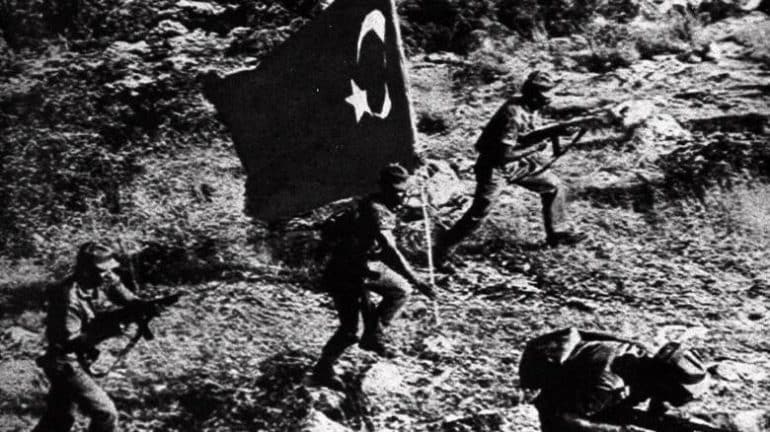"They put us in a room at the school in Voni, together with the rest of the family. They entered there whenever they wanted, chose and took us to satisfy their sexual desires. I wasn't going out to get a snack. I kept wearing grandma's clothes to look old but they could see the face. I only went out when I went to the bathroom. I was always wrapped in a quilt and all the little ones sat on top of me so that I wouldn't be constantly pulled and rushed by the Turks. This lasted three months, before the Red Cross came."
As reported by DW, this is one of the few testimonies of female rape victims during the Turkish invasion of Cyprus in 1974, published by Cypriot media (Cyprus News Agency, 2016), breaking the silence that prevailed for years around the issue.
The crime described occurred in the occupied village of Voni in the province of Nicosia, which had been used by the Turkish army as a detention camp for women and children. Camps of this type had also been created in the villages of the province of Famagusta, Vicsada, Marathovouno and Gypsos, and there, according to testimonies, systematic rapes were committed by the Turkish army. The women were released intermittently after the 16 August 1974 ceasefire agreement.
Their release lasted until the middle of October of that year. On reaching the free zones, like all internees of that period, the women were asked to give statements to either government officials or the Red Cross about their experiences.
Many of those statements of those trapped were to be used years later to locate missing Greek Cypriots, who were killed during the advance of the Turkish army.
For the women of the war, those who were victims of rape, confessing the trauma was anything but easy, since it would have meant ostracizing them from the social environment of rural Cyprus at the time and also excluding them from the possibility of getting married.
Therefore, there were many who did not even admit their sufferings in their statements to the Red Cross. Despite this, many confessed and together with the hearsay testimonies, the female victims of the war are counted today in three-digit numbers.
Victimization again
The Golgotha of many female victims of the war did not stop even in the security of the areas, which after the end of the hostilities were controlled by the Republic of Cyprus. Within the Greek Cypriot community, these women were in many cases treated as dishonoured. Indicative of the social stigma that accompanied them after the end of the war are testimonies collected by the former AKEL member of parliament Skevi Koukoumas, who was the first politician to raise in 2015 in the parliament the issue of the state's obligation, for political care and support of them of the women.
Speaking to DW, Ms. Koukuma refers to the cases of women who were abandoned by their husbands and by their own families, immediately after the discovery of their rape. The phenomenon of the abandonment of abused women was also stigmatized in one of his best-known poems by the poet Pantelis Mechanicos.
In "Ite" the Greek Cypriot poet wrote in 1975: "And what do you expect from people / who raped their women in front of their eyes / and did not pull their knife. / Dispassionately / then / and dispassionately / today / they simply ask / for a divorce...".
Mrs. Koukuma emphasizes, however, that the majority of the women who were in a hurry hide the traumatic experience to this day, while many families keep the events of '74 buried as a family secret. There are also many women who left Cyprus under the burden of social stigma.
Discussion 41 years later
The drama of women who were victims of rape during the Turkish invasion was recognized for the first time by the Cypriot state in 2015, when it was decided to grant a monthly allowance of one thousand euros to women who would be considered "victims of the Turkish invasion" according to the "victims law ». State care for these women, however, did not arrive without subjecting them to yet another test. Indicatively, shortly before the implementation of the decision by the Ministry of Labour, evidence was requested that the women applying for benefits had indeed been victims of rape.
Such evidence would only be confirmations of the statements made by these women to the Red Cross in 1974. The state's demand was finally withdrawn thanks to the intervention of the then AKEL Member of Parliament Skevis Koukoumas, who herself undertook the collection of applications from hurried women, and the deceased Minister of Labor, Zetas Emilianidou, who bypassed the bureaucratic procedures.
Speaking to DW today, as the now general secretary of the POGO Women's Movement, Ms Kukuma explained that she continues to help female victims in the process of applying for benefits.
Today, a total of 76 women receive the support allowance, while the testimonies that keep arriving show that the victims of the sexual war crimes committed in Cyprus during the Turkish invasion are many hundreds more.
With info: DW
